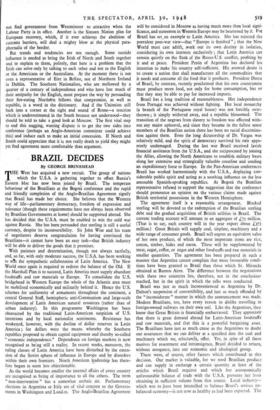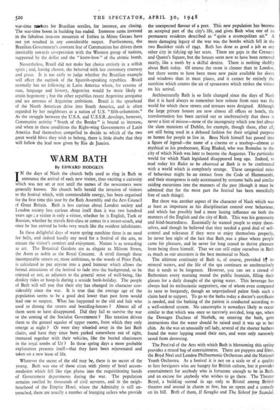BRAZIL DECIDES
By GEORGE BRINSMEAD THE West has acquired a new recruit. The group of nations which the U.S.A. is gathering together to offset Russia's Eastern bloc has now been joined by Brazil. The temperate behaviour of the Brazilians at the Bogota conference and the rapid and friendly completion of the Anglo-Brazilian Agreement signify that Brazil has made her choice. She believes that the Western way of life—parliamentary democracy, freedom of expression and tolerance (though these requirements have not always been observed by Brazilian Governments at home) should be supported abroad. She has decided that the U.S.A. must be enabled to win the cold war against Russia. She has been persuaded that sterling is still a useful currency, despite its inconvertibility. Sir John Wise and his team of negotiators deserve congratulation for having convinced the Brazilians—it cannot have been an easy task—that British industry will be able to deliver the goods that it promises.
With patience and determination, though not always tactfully, and, so far, with only moderate success, the U.S4 has been working to wlit the sympathetic collaboration of Latin America. The New World once again is required to redress the balance of the Old. If the Marshall Plan is to succeed, Latin America must supply abundant foodstuffs and raw materials to Europe. To consolidate the U.S. bridgehead in Western Europe the whole of the Atlantic area must be mobilised economically and militarily behind it. Hence the U.S. schemes for uniformity of armaments throughout the continent, a central General Staff, hemispheric anti-Commupism and large-scale development of Latin American natural resources (rather than of urban industry). In this programme Washington has been obstructed by the traditional Latin-American suspicion of U.S. intentions and by local nationalist sentiments. Resistance has weakened, however, with the decline of dollar reserves in Latin America ; for dollars were the means whereby the Southern republics proposed to obtain capital equipment and thereby so-called
economic independence." Dependence on foreign markets is now recognised as being still a reality. In recent weeks, moreover, the ruling classes of Latin America have been disturbed by the exten- sion of the Soviet sphere of influence in Europe and by disorders within their own frontiers. North. American leadership has there- fore begun to seem less objectionable.
- As the world becomes smaller the internal affairs of every country are recognised as being of importance to all the others. The term " non-intervention " has a .somewhat archaic air. Parliamentary elections in Argentina or Italy are of vital concern to the Govern- ments in Washington and London. The Anglo:Brazilian Agreement
will be considered in Moscow aa having much more than local signi- ficance, and statesmen in Western Europe may be heartened by it. Fox Brazil has set an example to Latin America. She has rejected the prevalent post-war view—that "Europe is finished " ; that the New World must cast adrift, pork out its own destiny in isolation, considering its own interests exclusively ; that Latin America can remain quietly on the flank of the Russo-U.S. conflict, profiting by it and at peace. President Peron of Argentina has declared his intention to make his country self-sufficient. His avowed desire is to create a nation that shall manufacture all the commodities that it needs and consume all the food that it produces. President Dutra of Brazil, by contrast, recently proclaimed that his own countrymen must produce more food, not only for home consumption, but so' that they may be able to pay for increased imports.
Brazil has a long tradition of reasonableness. Her independence from Portugal was achieved without fighting. Her local monarchy (a branch of the Portuguese royal house) was not forcibly over- thrown ; it simply withered away, and a republic blossomed. The transition of the negroes from slavery to freedom was effected with- out any major upheaval, and since they became in the fullest sense members of the Brazilian nation there has been no racial discrimina- tion against them. Even the long dictatorship of Dr. Vargas was relatively mild, and the spirit of democracy survived his rule appa- rently undamaged. During the last war Brazil received lavish financial assiitance from the U.S.A., and she reciprocated by joining the Allies, allowing the North Americans to establish military bases along her extensive and strategically valuable coastline and sending an expeditionary force to Europe. In the Pan-American conferences Brazil has worked harmoniously with the U.S.A., displaying con- siderable public spirit and acting as a soothing influence on the less amenable Spanish-speaking republics. At Bogota the Brazilian representative refused to support the suggestion that the conference should pronounce an opinion on the various claims made against British territorial possessions in the Western Hemisphere.
The agreement itself is a reasonable arrangement. Blocked sterling will be devoted to the redemption of the Brazilian sterling debt and the gradual acquisition of British utilities in Brazil. The current trading account will amount to an aggregate of £75 million. (That is to say, each country will in the year export about £371 million.) Great Britain will supply coal, tinplate, machinery and a wide range of consumer goods. Brazil will export an equivalent value of her own produce, of which the most important items are rice, cotton, timber, hides and cocoa. These will be supplemented by meat, sugar, coffee, or anges and other foodstuffs and raw materials in smaller quantities. The agreement has been prepared in such a manner that Argentina cannot complain that more favourable condi- tions have been granted to Brazil than those which Sr. Miranda obtained at Buenos Aires. The difference between the negotiations with these two countries lies, therefore, not in the conclusions reached, but in the spirit in which the talks were conducted.
Brazil was just as much inconvenienced as Argentina by Dr. Dalton's suspension of convertibility, and just as much offended by the " inconsiderate " manner in which the announcement was made. Modern Brazilians, too, have every reason to dislike travelling in foreign-owned railways on their own soil. Like the Argentines, they know that Great Britain is financially embarrassed. They appreciate that there is great demand abroad for Latin-American foodstuffs and raw materials, and that this is a powerful bargaining asset. The Brazilians have just as much cause as the Argentines to doubt our assurances that we can deliver at a specified date the coal and machinery which we, reluctantly, offer. Yet, in spite of all these motives for resentment and intransigence, Brazil decided to return, without arrogance, into our economic and ideological group.
There were, of course, other factors which contributed to this decision. Our market is valuable, for we need Brazilian produce and can supply in exchange a certain quantity at least of the articles which Brazil requires and which her astronomically unfavourable balance of trade with the U.S.A. prevents her from obtaining in sufficient volume from that source. Local industry— which was to jiave been intensified to balance Brazil's serious un- balanced economy—is not now as healthy as had been expected. The war-time =octets for Brazilian textiles, for instance, are closing. The war-time boom in building has ended. Immense sums invested in the fabulous iron-ore mountain of Itabira in Minas Geraes have not yet resulted in any considerable output. Furthermore, the Brazilian Government's constant fear of Communism has driven them inevitably towards co-operation with the Western group of nations, supported by the dollar and the " know-how " of the atomic bomb.
Nevertheless, Brazil did not make her choice entirely in a selfish spirit ; and, having chosen, she behaved with her customary courtesy and grace. It is too early to judge whether the Brazilian example will affect the outlook of the Spanish-speaking republics. -Brazil normally has no following in Latin America where, for reasons of race, language and history, Argentina would be more likely to attain hegemony ; but the other republics resent Argentine arrogance and are nervous of Argentine ambitions. Brazil is the spearhead of the North American drive into South America, and is often regarded by her neighbours as a nation of U.S. "fifth-columnists." As the struggle between the U.S.A. and U.S.S.R. develops, however, Communist activity "South of the Border" is bound to increase, and when in these conditions the Right-wing Governments of Latin America find themselves compelled to decide to which of the two great world blocs they wish to belong, there is little doubt that they will folio* the lead now given by Rio de Janeiro.































 Previous page
Previous page